Case Study Analysis: Legislation, Court, Policing, Larceny & LEPRA
VerifiedAdded on 2023/03/31
|6
|1597
|206
Case Study
AI Summary
This case study analyzes several instances of potential larceny, examining them under the Crimes Act 1900 and the Law Enforcement (Powers and Responsibilities) Act 2002 (LEPRA). It assesses whether the elements of larceny are met in scenarios involving shoplifting and dishonest behavior in a supermarket. The study also discusses the powers of arrest under LEPRA, the importance of cautioning suspects, and alternatives to arrest. Furthermore, it emphasizes the rule of law and justifications for police powers in the context of larceny investigations. Desklib provides access to this and many other solved assignments for students.
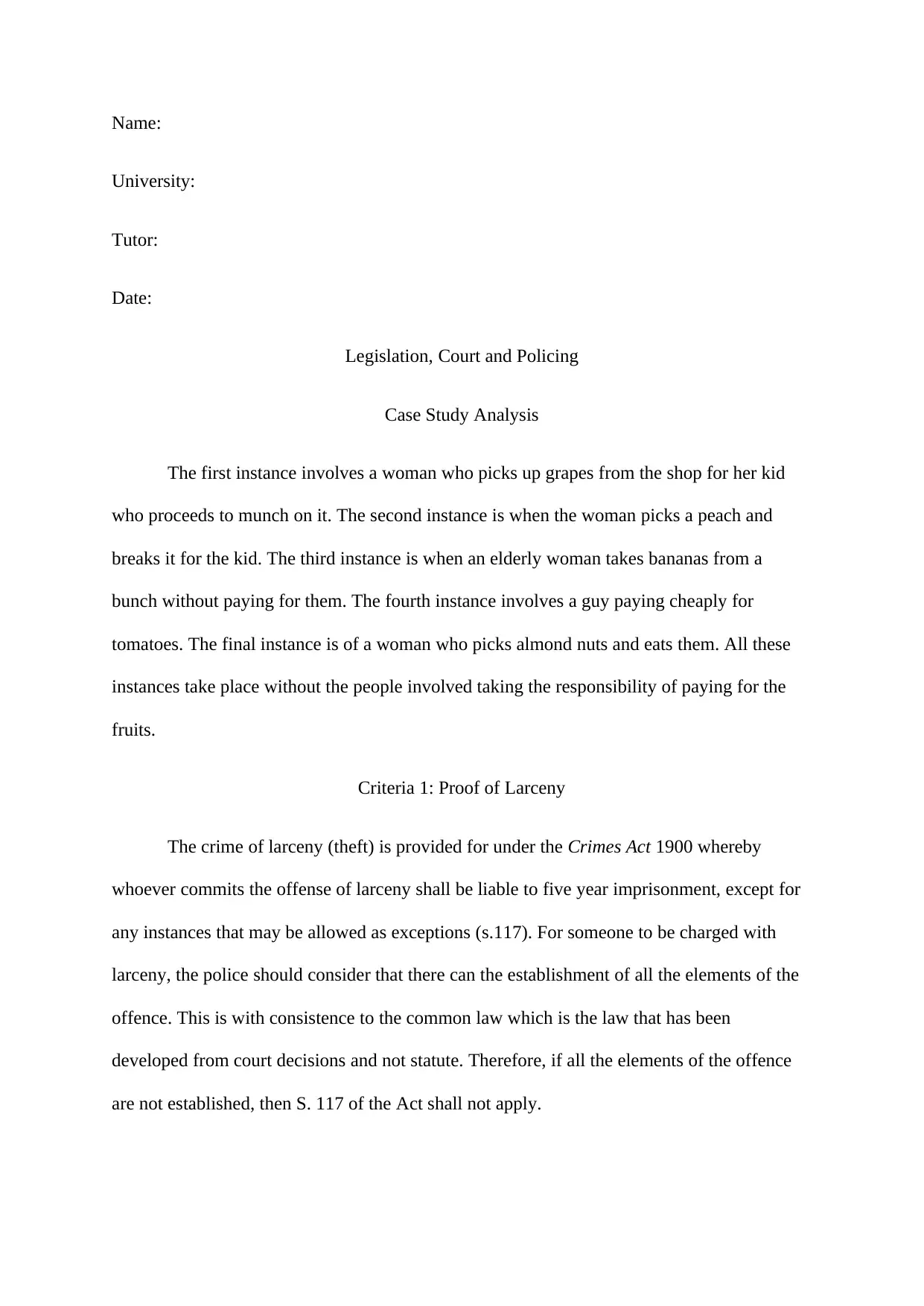
Name:
University:
Tutor:
Date:
Legislation, Court and Policing
Case Study Analysis
The first instance involves a woman who picks up grapes from the shop for her kid
who proceeds to munch on it. The second instance is when the woman picks a peach and
breaks it for the kid. The third instance is when an elderly woman takes bananas from a
bunch without paying for them. The fourth instance involves a guy paying cheaply for
tomatoes. The final instance is of a woman who picks almond nuts and eats them. All these
instances take place without the people involved taking the responsibility of paying for the
fruits.
Criteria 1: Proof of Larceny
The crime of larceny (theft) is provided for under the Crimes Act 1900 whereby
whoever commits the offense of larceny shall be liable to five year imprisonment, except for
any instances that may be allowed as exceptions (s.117). For someone to be charged with
larceny, the police should consider that there can the establishment of all the elements of the
offence. This is with consistence to the common law which is the law that has been
developed from court decisions and not statute. Therefore, if all the elements of the offence
are not established, then S. 117 of the Act shall not apply.
University:
Tutor:
Date:
Legislation, Court and Policing
Case Study Analysis
The first instance involves a woman who picks up grapes from the shop for her kid
who proceeds to munch on it. The second instance is when the woman picks a peach and
breaks it for the kid. The third instance is when an elderly woman takes bananas from a
bunch without paying for them. The fourth instance involves a guy paying cheaply for
tomatoes. The final instance is of a woman who picks almond nuts and eats them. All these
instances take place without the people involved taking the responsibility of paying for the
fruits.
Criteria 1: Proof of Larceny
The crime of larceny (theft) is provided for under the Crimes Act 1900 whereby
whoever commits the offense of larceny shall be liable to five year imprisonment, except for
any instances that may be allowed as exceptions (s.117). For someone to be charged with
larceny, the police should consider that there can the establishment of all the elements of the
offence. This is with consistence to the common law which is the law that has been
developed from court decisions and not statute. Therefore, if all the elements of the offence
are not established, then S. 117 of the Act shall not apply.
Paraphrase This Document
Need a fresh take? Get an instant paraphrase of this document with our AI Paraphraser
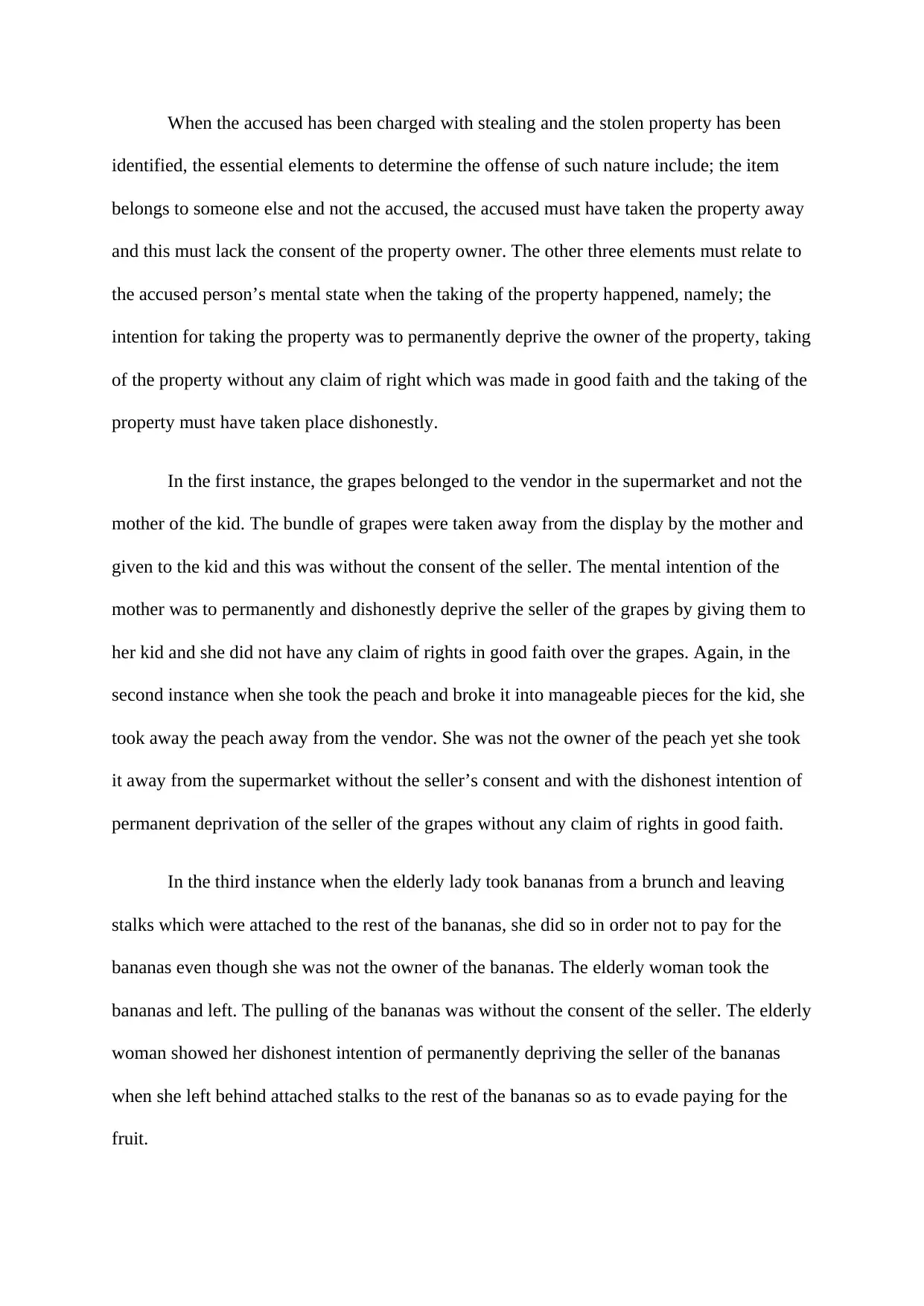
When the accused has been charged with stealing and the stolen property has been
identified, the essential elements to determine the offense of such nature include; the item
belongs to someone else and not the accused, the accused must have taken the property away
and this must lack the consent of the property owner. The other three elements must relate to
the accused person’s mental state when the taking of the property happened, namely; the
intention for taking the property was to permanently deprive the owner of the property, taking
of the property without any claim of right which was made in good faith and the taking of the
property must have taken place dishonestly.
In the first instance, the grapes belonged to the vendor in the supermarket and not the
mother of the kid. The bundle of grapes were taken away from the display by the mother and
given to the kid and this was without the consent of the seller. The mental intention of the
mother was to permanently and dishonestly deprive the seller of the grapes by giving them to
her kid and she did not have any claim of rights in good faith over the grapes. Again, in the
second instance when she took the peach and broke it into manageable pieces for the kid, she
took away the peach away from the vendor. She was not the owner of the peach yet she took
it away from the supermarket without the seller’s consent and with the dishonest intention of
permanent deprivation of the seller of the grapes without any claim of rights in good faith.
In the third instance when the elderly lady took bananas from a brunch and leaving
stalks which were attached to the rest of the bananas, she did so in order not to pay for the
bananas even though she was not the owner of the bananas. The elderly woman took the
bananas and left. The pulling of the bananas was without the consent of the seller. The elderly
woman showed her dishonest intention of permanently depriving the seller of the bananas
when she left behind attached stalks to the rest of the bananas so as to evade paying for the
fruit.
identified, the essential elements to determine the offense of such nature include; the item
belongs to someone else and not the accused, the accused must have taken the property away
and this must lack the consent of the property owner. The other three elements must relate to
the accused person’s mental state when the taking of the property happened, namely; the
intention for taking the property was to permanently deprive the owner of the property, taking
of the property without any claim of right which was made in good faith and the taking of the
property must have taken place dishonestly.
In the first instance, the grapes belonged to the vendor in the supermarket and not the
mother of the kid. The bundle of grapes were taken away from the display by the mother and
given to the kid and this was without the consent of the seller. The mental intention of the
mother was to permanently and dishonestly deprive the seller of the grapes by giving them to
her kid and she did not have any claim of rights in good faith over the grapes. Again, in the
second instance when she took the peach and broke it into manageable pieces for the kid, she
took away the peach away from the vendor. She was not the owner of the peach yet she took
it away from the supermarket without the seller’s consent and with the dishonest intention of
permanent deprivation of the seller of the grapes without any claim of rights in good faith.
In the third instance when the elderly lady took bananas from a brunch and leaving
stalks which were attached to the rest of the bananas, she did so in order not to pay for the
bananas even though she was not the owner of the bananas. The elderly woman took the
bananas and left. The pulling of the bananas was without the consent of the seller. The elderly
woman showed her dishonest intention of permanently depriving the seller of the bananas
when she left behind attached stalks to the rest of the bananas so as to evade paying for the
fruit.
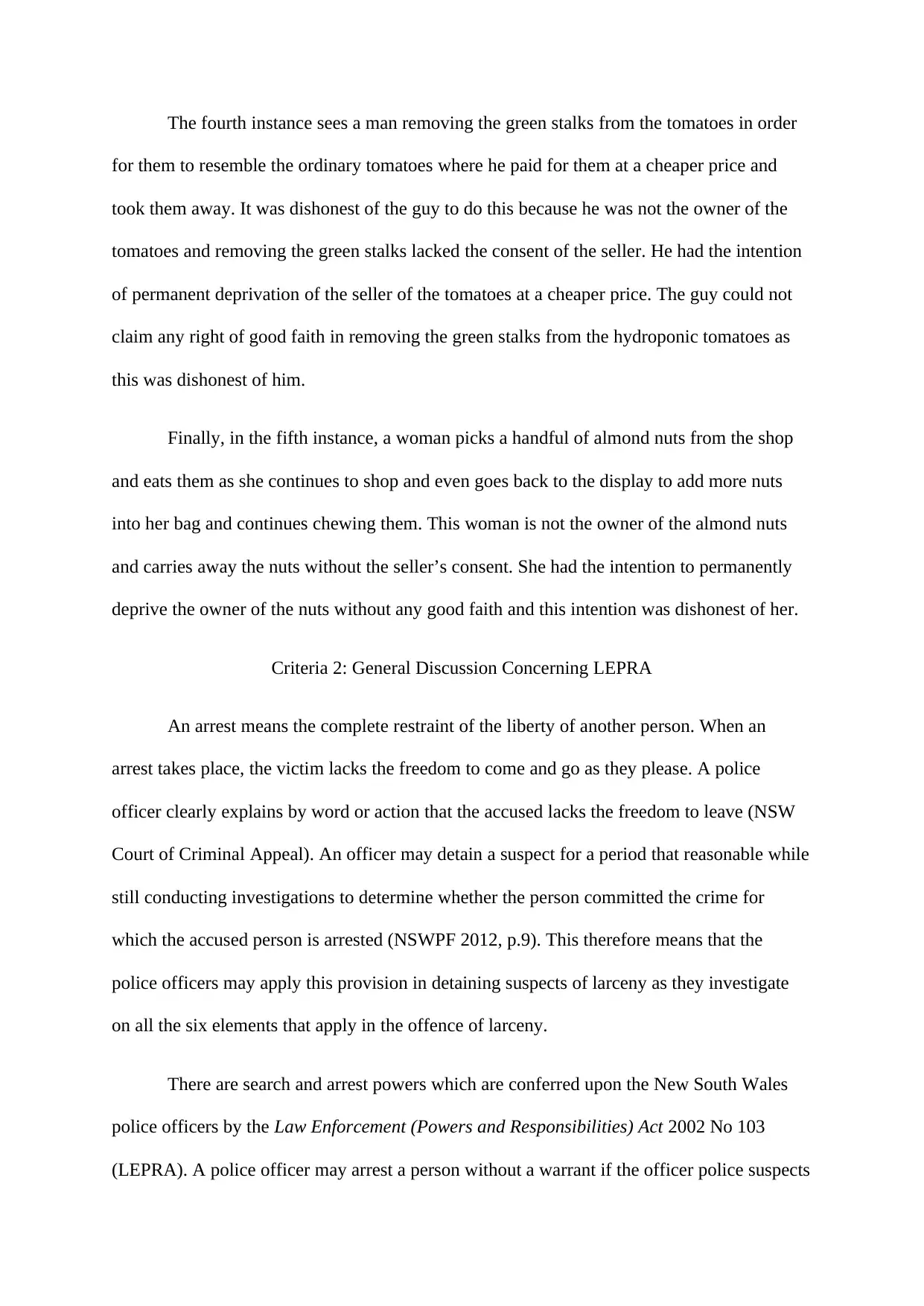
The fourth instance sees a man removing the green stalks from the tomatoes in order
for them to resemble the ordinary tomatoes where he paid for them at a cheaper price and
took them away. It was dishonest of the guy to do this because he was not the owner of the
tomatoes and removing the green stalks lacked the consent of the seller. He had the intention
of permanent deprivation of the seller of the tomatoes at a cheaper price. The guy could not
claim any right of good faith in removing the green stalks from the hydroponic tomatoes as
this was dishonest of him.
Finally, in the fifth instance, a woman picks a handful of almond nuts from the shop
and eats them as she continues to shop and even goes back to the display to add more nuts
into her bag and continues chewing them. This woman is not the owner of the almond nuts
and carries away the nuts without the seller’s consent. She had the intention to permanently
deprive the owner of the nuts without any good faith and this intention was dishonest of her.
Criteria 2: General Discussion Concerning LEPRA
An arrest means the complete restraint of the liberty of another person. When an
arrest takes place, the victim lacks the freedom to come and go as they please. A police
officer clearly explains by word or action that the accused lacks the freedom to leave (NSW
Court of Criminal Appeal). An officer may detain a suspect for a period that reasonable while
still conducting investigations to determine whether the person committed the crime for
which the accused person is arrested (NSWPF 2012, p.9). This therefore means that the
police officers may apply this provision in detaining suspects of larceny as they investigate
on all the six elements that apply in the offence of larceny.
There are search and arrest powers which are conferred upon the New South Wales
police officers by the Law Enforcement (Powers and Responsibilities) Act 2002 No 103
(LEPRA). A police officer may arrest a person without a warrant if the officer police suspects
for them to resemble the ordinary tomatoes where he paid for them at a cheaper price and
took them away. It was dishonest of the guy to do this because he was not the owner of the
tomatoes and removing the green stalks lacked the consent of the seller. He had the intention
of permanent deprivation of the seller of the tomatoes at a cheaper price. The guy could not
claim any right of good faith in removing the green stalks from the hydroponic tomatoes as
this was dishonest of him.
Finally, in the fifth instance, a woman picks a handful of almond nuts from the shop
and eats them as she continues to shop and even goes back to the display to add more nuts
into her bag and continues chewing them. This woman is not the owner of the almond nuts
and carries away the nuts without the seller’s consent. She had the intention to permanently
deprive the owner of the nuts without any good faith and this intention was dishonest of her.
Criteria 2: General Discussion Concerning LEPRA
An arrest means the complete restraint of the liberty of another person. When an
arrest takes place, the victim lacks the freedom to come and go as they please. A police
officer clearly explains by word or action that the accused lacks the freedom to leave (NSW
Court of Criminal Appeal). An officer may detain a suspect for a period that reasonable while
still conducting investigations to determine whether the person committed the crime for
which the accused person is arrested (NSWPF 2012, p.9). This therefore means that the
police officers may apply this provision in detaining suspects of larceny as they investigate
on all the six elements that apply in the offence of larceny.
There are search and arrest powers which are conferred upon the New South Wales
police officers by the Law Enforcement (Powers and Responsibilities) Act 2002 No 103
(LEPRA). A police officer may arrest a person without a warrant if the officer police suspects
⊘ This is a preview!⊘
Do you want full access?
Subscribe today to unlock all pages.

Trusted by 1+ million students worldwide
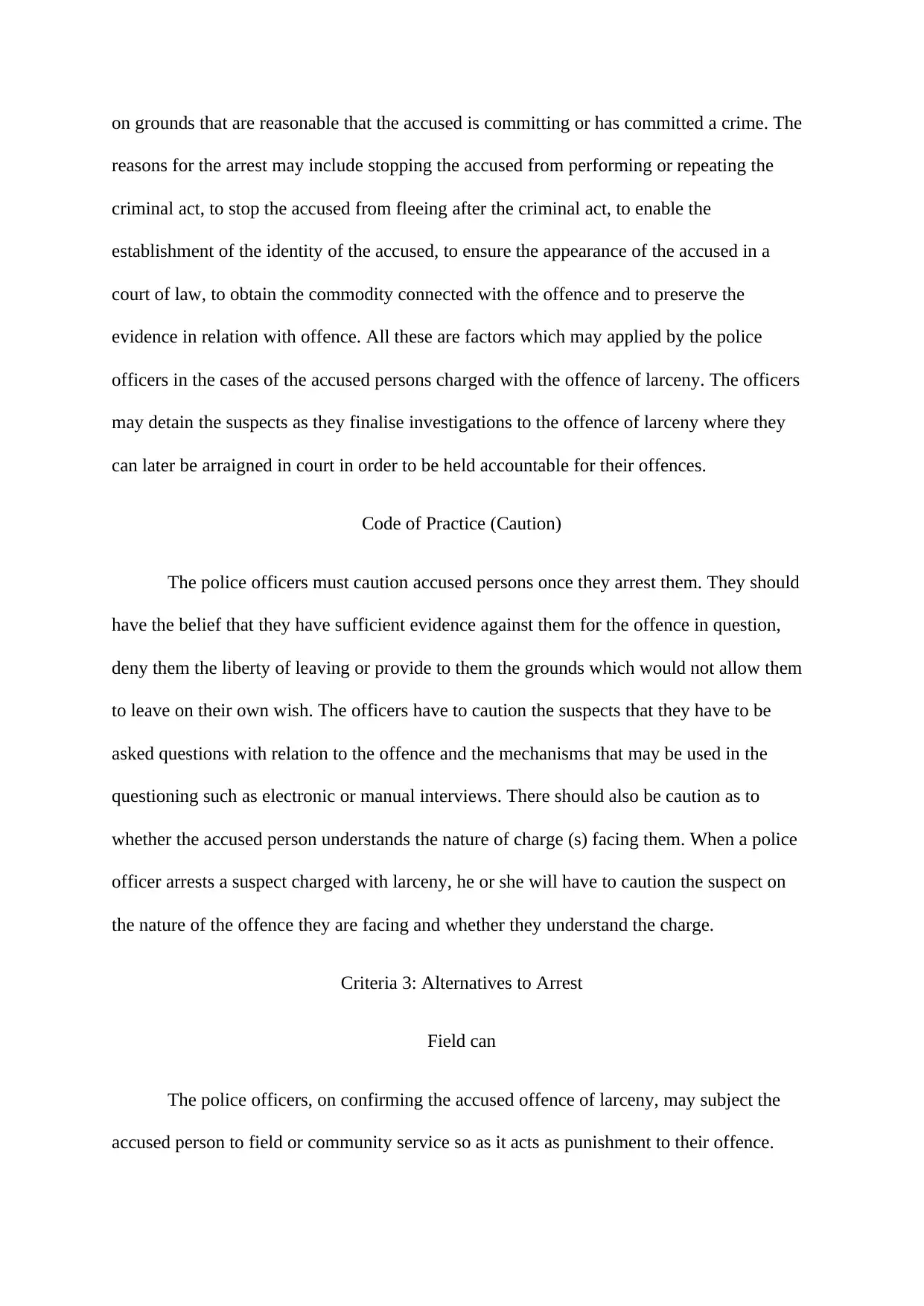
on grounds that are reasonable that the accused is committing or has committed a crime. The
reasons for the arrest may include stopping the accused from performing or repeating the
criminal act, to stop the accused from fleeing after the criminal act, to enable the
establishment of the identity of the accused, to ensure the appearance of the accused in a
court of law, to obtain the commodity connected with the offence and to preserve the
evidence in relation with offence. All these are factors which may applied by the police
officers in the cases of the accused persons charged with the offence of larceny. The officers
may detain the suspects as they finalise investigations to the offence of larceny where they
can later be arraigned in court in order to be held accountable for their offences.
Code of Practice (Caution)
The police officers must caution accused persons once they arrest them. They should
have the belief that they have sufficient evidence against them for the offence in question,
deny them the liberty of leaving or provide to them the grounds which would not allow them
to leave on their own wish. The officers have to caution the suspects that they have to be
asked questions with relation to the offence and the mechanisms that may be used in the
questioning such as electronic or manual interviews. There should also be caution as to
whether the accused person understands the nature of charge (s) facing them. When a police
officer arrests a suspect charged with larceny, he or she will have to caution the suspect on
the nature of the offence they are facing and whether they understand the charge.
Criteria 3: Alternatives to Arrest
Field can
The police officers, on confirming the accused offence of larceny, may subject the
accused person to field or community service so as it acts as punishment to their offence.
reasons for the arrest may include stopping the accused from performing or repeating the
criminal act, to stop the accused from fleeing after the criminal act, to enable the
establishment of the identity of the accused, to ensure the appearance of the accused in a
court of law, to obtain the commodity connected with the offence and to preserve the
evidence in relation with offence. All these are factors which may applied by the police
officers in the cases of the accused persons charged with the offence of larceny. The officers
may detain the suspects as they finalise investigations to the offence of larceny where they
can later be arraigned in court in order to be held accountable for their offences.
Code of Practice (Caution)
The police officers must caution accused persons once they arrest them. They should
have the belief that they have sufficient evidence against them for the offence in question,
deny them the liberty of leaving or provide to them the grounds which would not allow them
to leave on their own wish. The officers have to caution the suspects that they have to be
asked questions with relation to the offence and the mechanisms that may be used in the
questioning such as electronic or manual interviews. There should also be caution as to
whether the accused person understands the nature of charge (s) facing them. When a police
officer arrests a suspect charged with larceny, he or she will have to caution the suspect on
the nature of the offence they are facing and whether they understand the charge.
Criteria 3: Alternatives to Arrest
Field can
The police officers, on confirming the accused offence of larceny, may subject the
accused person to field or community service so as it acts as punishment to their offence.
Paraphrase This Document
Need a fresh take? Get an instant paraphrase of this document with our AI Paraphraser
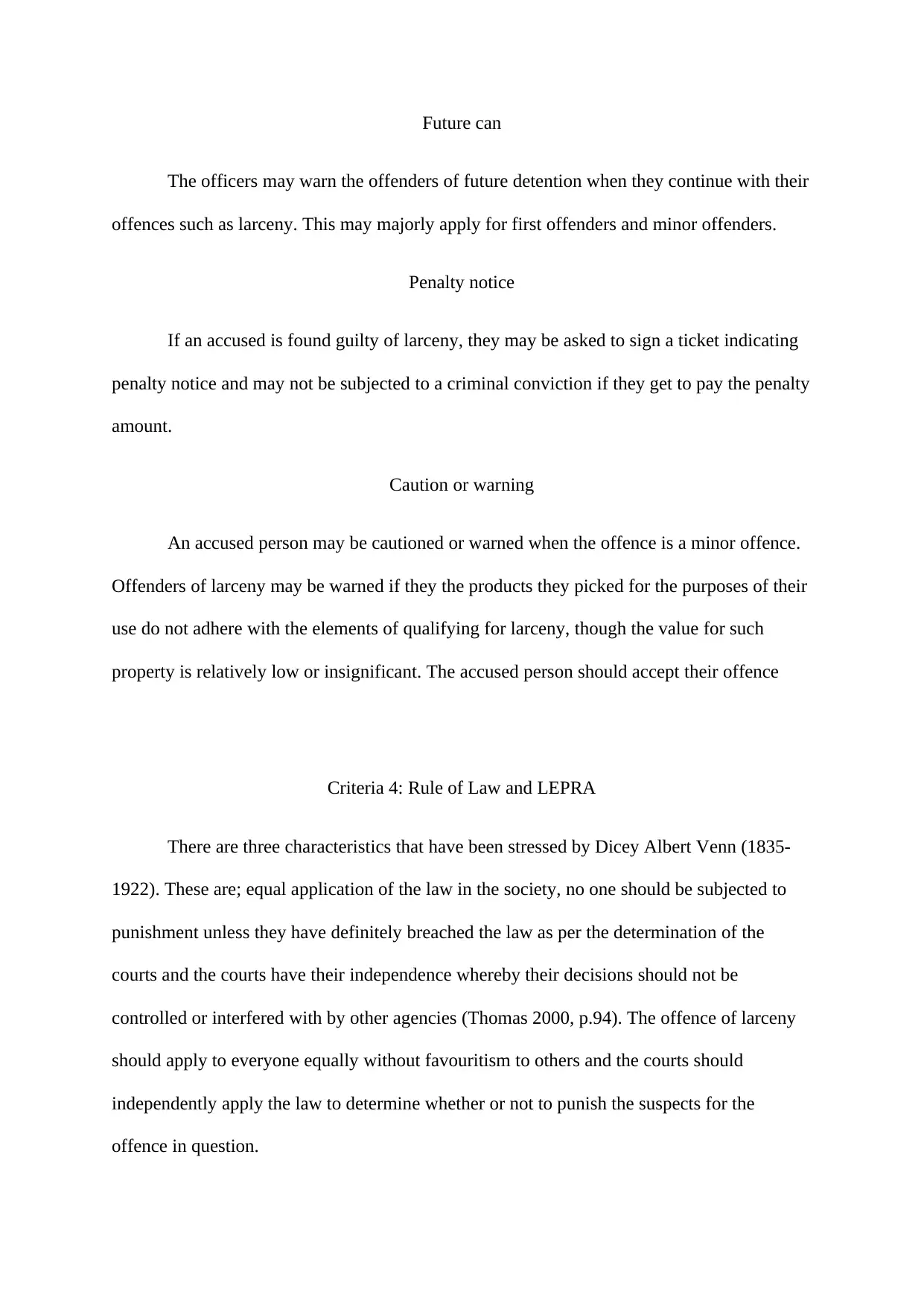
Future can
The officers may warn the offenders of future detention when they continue with their
offences such as larceny. This may majorly apply for first offenders and minor offenders.
Penalty notice
If an accused is found guilty of larceny, they may be asked to sign a ticket indicating
penalty notice and may not be subjected to a criminal conviction if they get to pay the penalty
amount.
Caution or warning
An accused person may be cautioned or warned when the offence is a minor offence.
Offenders of larceny may be warned if they the products they picked for the purposes of their
use do not adhere with the elements of qualifying for larceny, though the value for such
property is relatively low or insignificant. The accused person should accept their offence
Criteria 4: Rule of Law and LEPRA
There are three characteristics that have been stressed by Dicey Albert Venn (1835-
1922). These are; equal application of the law in the society, no one should be subjected to
punishment unless they have definitely breached the law as per the determination of the
courts and the courts have their independence whereby their decisions should not be
controlled or interfered with by other agencies (Thomas 2000, p.94). The offence of larceny
should apply to everyone equally without favouritism to others and the courts should
independently apply the law to determine whether or not to punish the suspects for the
offence in question.
The officers may warn the offenders of future detention when they continue with their
offences such as larceny. This may majorly apply for first offenders and minor offenders.
Penalty notice
If an accused is found guilty of larceny, they may be asked to sign a ticket indicating
penalty notice and may not be subjected to a criminal conviction if they get to pay the penalty
amount.
Caution or warning
An accused person may be cautioned or warned when the offence is a minor offence.
Offenders of larceny may be warned if they the products they picked for the purposes of their
use do not adhere with the elements of qualifying for larceny, though the value for such
property is relatively low or insignificant. The accused person should accept their offence
Criteria 4: Rule of Law and LEPRA
There are three characteristics that have been stressed by Dicey Albert Venn (1835-
1922). These are; equal application of the law in the society, no one should be subjected to
punishment unless they have definitely breached the law as per the determination of the
courts and the courts have their independence whereby their decisions should not be
controlled or interfered with by other agencies (Thomas 2000, p.94). The offence of larceny
should apply to everyone equally without favouritism to others and the courts should
independently apply the law to determine whether or not to punish the suspects for the
offence in question.
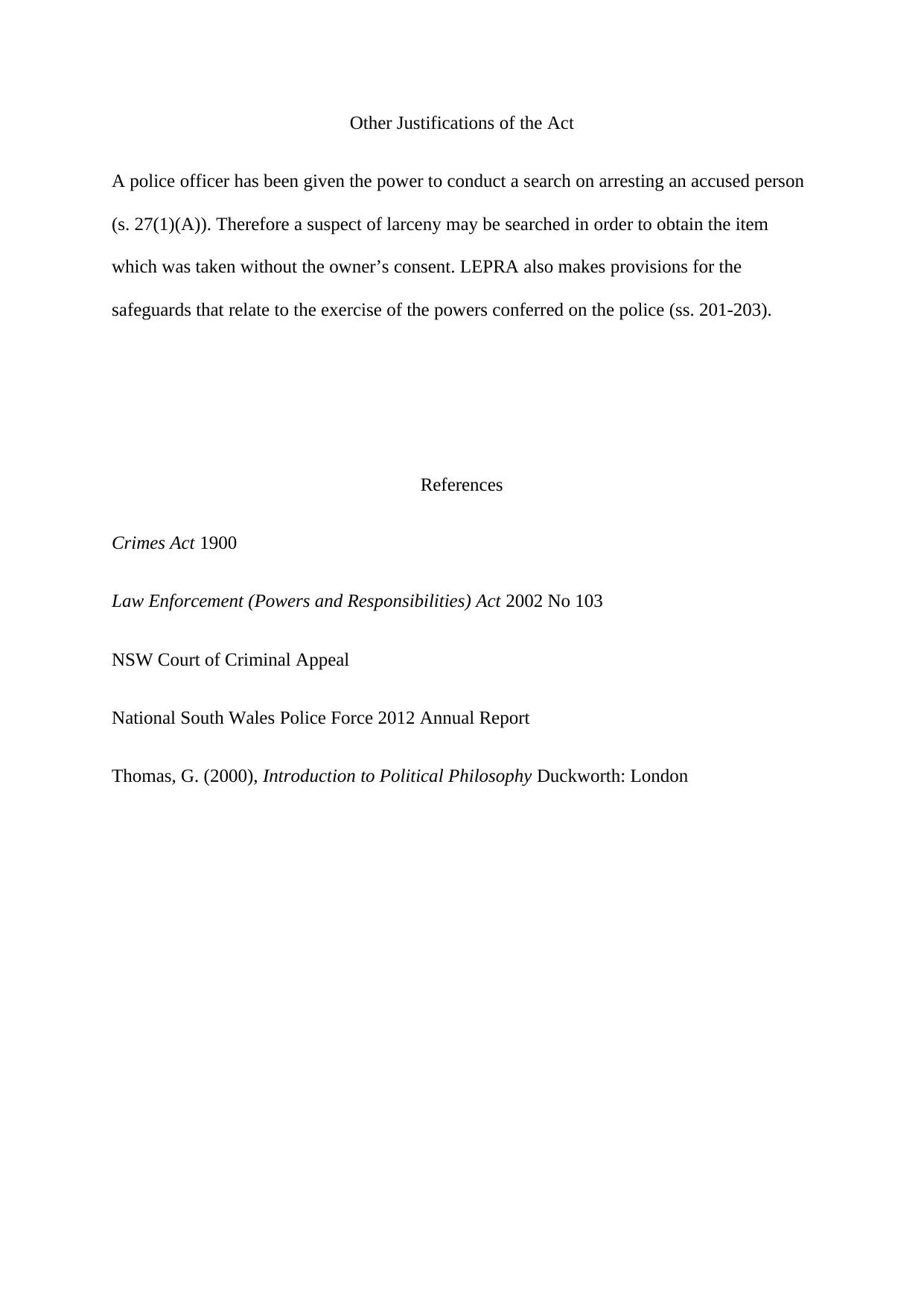
Other Justifications of the Act
A police officer has been given the power to conduct a search on arresting an accused person
(s. 27(1)(A)). Therefore a suspect of larceny may be searched in order to obtain the item
which was taken without the owner’s consent. LEPRA also makes provisions for the
safeguards that relate to the exercise of the powers conferred on the police (ss. 201-203).
References
Crimes Act 1900
Law Enforcement (Powers and Responsibilities) Act 2002 No 103
NSW Court of Criminal Appeal
National South Wales Police Force 2012 Annual Report
Thomas, G. (2000), Introduction to Political Philosophy Duckworth: London
A police officer has been given the power to conduct a search on arresting an accused person
(s. 27(1)(A)). Therefore a suspect of larceny may be searched in order to obtain the item
which was taken without the owner’s consent. LEPRA also makes provisions for the
safeguards that relate to the exercise of the powers conferred on the police (ss. 201-203).
References
Crimes Act 1900
Law Enforcement (Powers and Responsibilities) Act 2002 No 103
NSW Court of Criminal Appeal
National South Wales Police Force 2012 Annual Report
Thomas, G. (2000), Introduction to Political Philosophy Duckworth: London
⊘ This is a preview!⊘
Do you want full access?
Subscribe today to unlock all pages.

Trusted by 1+ million students worldwide
1 out of 6
Related Documents
Your All-in-One AI-Powered Toolkit for Academic Success.
+13062052269
info@desklib.com
Available 24*7 on WhatsApp / Email
![[object Object]](/_next/static/media/star-bottom.7253800d.svg)
Unlock your academic potential
Copyright © 2020–2026 A2Z Services. All Rights Reserved. Developed and managed by ZUCOL.



